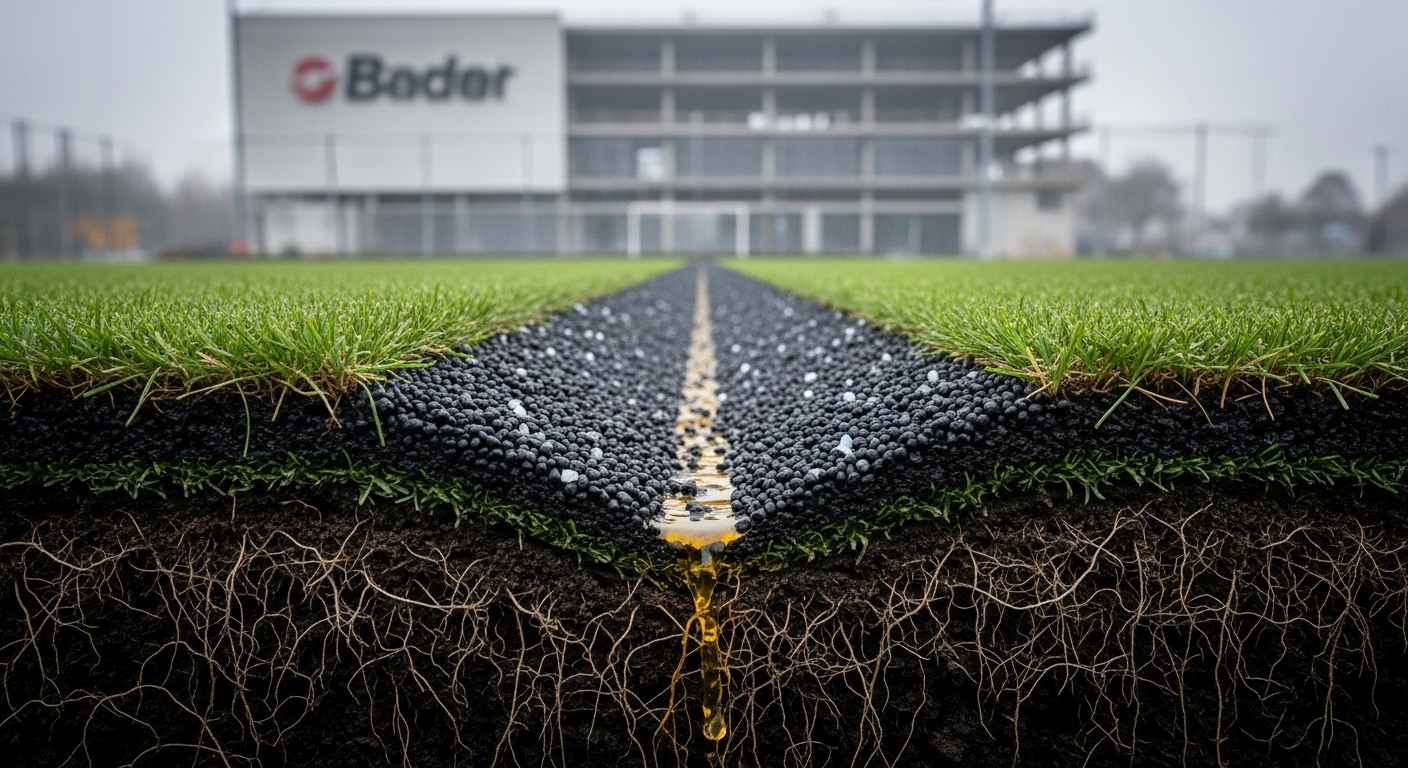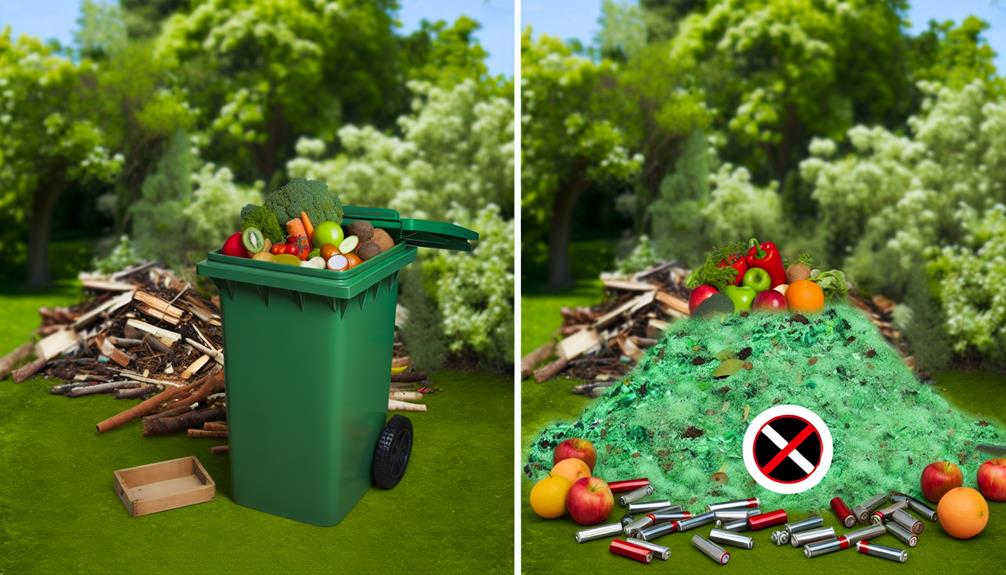

You can’t compost batteries because they contain toxic chemicals like lead, cadmium, and mercury, which are harmful to the environment. Composting relies on the natural organic breakdown process, and these hazardous substances can disrupt it, contaminating soil and water.
Instead, properly dispose of batteries at designated recycling centers or special collection events. This helps prevent chemical leaching, protecting plants, wildlife, and community health. Trust me, recycling is essential for a sustainable future. Learn all the best ways to dispose of batteries safely and protect our planet more effectively.
Batteries can’t be composted because they contain toxic chemicals that would contaminate the compost and harm the environment. When you think about composting, you’re imagining a natural, earthy process where organic materials break down into nutrient-rich soil. Batteries just don’t fit into that picture.
They’re packed with harmful substances like lead, cadmium, and mercury, which can leach into the soil and water, causing significant damage.
You belong to a community that cares about the planet, and understanding the right way to handle waste is essential. Properly disposing of batteries means taking them to designated recycling centers, where they can be safely processed. By doing this, you’re helping protect our shared environment and ensuring that compost remains a safe, beneficial resource for everyone.
Also Read: Can You Compost Balloon?
When you think about batteries, it’s important to understand the environmental risks they pose, especially through toxic chemical leaching.
These harmful substances can seep into the soil and eventually contaminate water sources, posing serious threats to ecosystems and human health. Addressing these risks is essential for protecting our planet and ensuring a sustainable future.
Leaking toxic chemicals from improperly disposed batteries poses significant environmental hazards. When batteries aren’t discarded correctly, they release harmful substances like lead, mercury, and cadmium. These toxic chemicals can seep into the ground, affecting plants and animals.
You might think tossing a single battery doesn’t matter, but collectively, it adds up. Imagine the impact if everyone did that! It’s essential to handle battery disposal responsibly. By doing so, you’re not just protecting the environment; you’re showing you care about our community and future generations.
Join others in taking action—recycle batteries at designated centers to prevent these dangerous chemicals from leaching into the environment. Together, we can make a huge difference.
Contaminating soil and water with battery waste poses significant environmental risks that affect both ecosystems and human health. When batteries break down, they release harmful chemicals that seep into the ground and water sources. This contamination disrupts:
Also Read: Can You Compost Cotton Balls? The Shocking Truth Revealed!
Understanding the types of batteries and their associated hazards is essential for safe and effective composting. You need to know that not all batteries are the same, and their dangers vary.

Alkaline batteries, commonly used in household items, contain zinc and manganese, which can leak harmful chemicals.
Lithium-ion batteries, found in phones and laptops, can overheat and even cause fires if damaged.
Nickel-cadmium batteries, often used in power tools, contain toxic cadmium, posing serious environmental risks.
Lastly, lead-acid batteries, used in vehicles, are highly corrosive and contain lead, which is extremely hazardous.
Knowing these differences helps you better understand why you shouldn’t compost batteries and highlights the importance of proper disposal to protect our environment and community.
Also Read: How to Start a Compost Pile: A Beginner’s Guide
Given the hazards associated with different types of batteries, it’s important to know how to dispose of them properly to protect both the environment and your community.
Here’s how you can do it:
You’ve got several fantastic options for recycling your used batteries, making it easier than ever to do your part for the environment.
Local drop-off locations often accept a variety of battery types, and many retailers offer convenient take-back services.
If you prefer, mail-in recycling programs provide a hassle-free way to guarantee your batteries are handled responsibly.
Locating local drop-off locations for battery recycling programs is essential for ensuring that your used batteries are disposed of safely and responsibly. By participating in these programs, you’re contributing to a cleaner environment and a healthier community.
Here’s how you can find these drop-off points:
If local drop-off locations aren’t convenient for you, consider using mail-in recycling programs for your old batteries. These programs make it easy to recycle responsibly from the comfort of your home. You’ll receive a pre-paid shipping label, so all you need to do is pack up your used batteries and drop the package in the mail.
Here’s a quick comparison of some popular mail-in battery recycling programs:
| Program Name | Key Features |
|---|---|
| Call2Recycle | Free shipping, accepts all battery types |
| Battery Solutions | Prepaid recycling kits, eco-friendly options |
| TerraCycle | Recycles hard-to-recycle batteries, customizable options |
Many retailers offer convenient take-back services to help you recycle your old batteries responsibly. Participating in these programs is a great way to contribute to a cleaner environment while feeling part of a community that cares about sustainability.
Here’s how you can get started:
Also Read: DIY Composting Toilet Guide: Build Cheap, Eco-Friendly Now!
To guarantee safety, store used batteries in a cool, dry place away from flammable materials. This protects against leaks and potential fires. Use a non-metallic container, like a plastic or cardboard box, to avoid electrical discharge. Label the container and keep it out of reach of children and pets.
| Action | Why | Result |
|---|---|---|
| Store in cool, dry place | Prevents overheating and leaks | Safe and stable storage |
| Use non-metallic container | Avoids electrical discharge | Reduced risk of short-circuit |
| Keep away from kids and pets | Prevents accidental ingestion | Enhanced household safety |
Switching to rechargeable batteries is a practical and eco-friendly alternative to single-use batteries. By making this switch, you’ll reduce waste and save money in the long run. Rechargeable batteries can be used multiple times, minimizing the environmental impact.

Here are some compelling reasons to switch:
You can’t compost batteries, but don’t worry—there are plenty of better ways to handle them! By properly disposing of and recycling batteries, you’ll protect the environment and conserve valuable resources.
Make sure to use battery recycling programs and store used batteries safely until you can recycle them. Consider switching to rechargeable batteries to reduce waste.
By taking these steps, you’re actively contributing to a healthier planet for everyone. Let’s make responsible battery disposal a priority!
